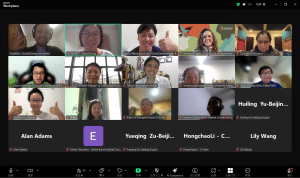As part of a series of interviews themed “Social Organizations Consultation”, the China Foundation Forum (CFF) recently conducted an interview with Tong Lihua, director of Zhicheng Public Interest Lawyers as well as founder of the Beijing Children’s Legal Aid and Research Center and Beijing Zhicheng Migrant Workers Legal Aid and Research Center.
CFF: It has been more than 20 years since you joined the charity sector. What was your motivation? What have you gained over the years?
Tong: I was born in an underdeveloped rural area and started to think about fairness and justice at a young age. I chose law studies as my major in university. After graduation, I entered the legal profession, and my first focus was on preventing juvenile delinquency.
After handling some cases, I found that the cause of many crimes committed by minors was that their rights were not protected at the first place. Many of them were victims of domestic violence and were largely ignored by the society. They were too young to legally work, which forced them to steal or rob in order to survive.
I realized the importance of advocating for the rights of vulnerable people, so I decided to take action. Our motivation as lawyers, “working for justice”, is a major driving force behind our efforts.
Migrant workers were another vulnerable group we noticed starting 2003. As of the end of 2019, we have provided direct legal assistance to more than 16,000 migrant workers, and more than 300,000 people have benefited from free legal advice.
CFF: Your team has participated in the drafting or demonstration of hundreds of laws, regulations and policies. What do you think are the advantages of being a law firm and a social organization?
Tong: There are two main advantages: One is the nature of benefiting public welfare as a social organization, and the other is our expertise — as professional lawyers.
CFF: How do you understand the role of “social organization consultation” in the socialist system of laws with Chinese characteristics?
Tong: Twenty years ago, no one talked about social organization in China, let alone social organization consultation, which is still in the developing stage today.
First of all, we need to show people more successful cases to prove to them that the participation of social organizations in democratic consultation is feasible and effective. On the basis of accumulated experience, we also need more in-depth research to guide social organizations to better participate in democratic consultation.
CFF: In the past 10 years, what progress has been made in promoting social organizations to participate in legislation and public affairs decision-making?
Tong: I think participation in democratic consultation and decision-making in public affairs should be reflected in the pursuit of social organizations and reflected in their daily work.
In terms of the development of social organizations themselves, I have always stressed that all kinds of social organizations should pursue their own professionalism. The higher the degree of specialization, the more opportunities we have to participate in public decision-making such as hearings, and the higher the quality of our participation.
For example, for organizations that provide community services or specialized services for specific groups such as the elderly and certain minors, if they have a very high degree of specialization, when government departments make relevant public decisions, they will think that they need to listen to your opinions to make better decisions.
CFF: Do you have any suggestions on promoting the rule of law in the field of charity?
Tong: The perception of the society towards philanthropy will directly affect the dominant ideas of legislation. Over the past 20 years or so, fundamental changes have taken place in China, and we should adopt a new concept to understand charity.
Philanthropy plays a particularly important role in solving the problem of wealth disparity, promoting the social moral concept of benevolence, promoting enterprises to fulfill their social responsibilities, and promoting entrepreneurs to be rich, responsible and loving.
On the basis of the recognition from all sectors of society that philanthropy must be vigorously developed and is of special significance to society, what obstacles are still affecting and limiting the development of the sector? This should be addressed at the legislative and policy levels.
At present, there is still much room for reform in the Charity Law and various laws, regulations and policies related to the sector, and these reforms should be put on the agenda as soon as possible.
CFF: What suggestions do you have for social organizations to participate in global governance?
Tong: When Chinese social organizations step onto the global stage, they must first think clearly about why they need to do this. For us, we go global in the field of child protection because we believe that the experience we have accumulated in China can be useful to other developing countries, and we want to share it to provide a reference for the growth of child protection lawyers in other countries.
In order to go global, Chinese social organizations must develop an international vision, understand the differences between countries, be aware of the problems that may need to be paid attention to when carrying out projects in these countries and be fully prepared.



